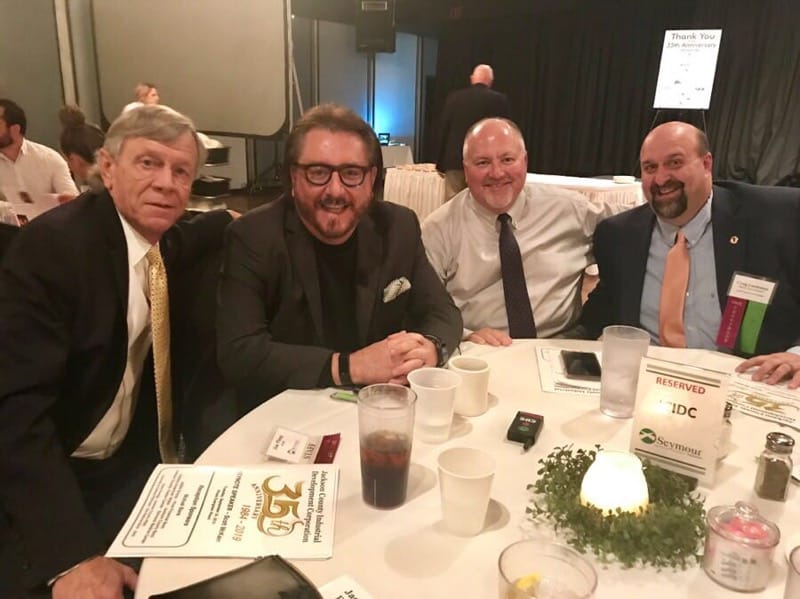
Nov 30, 2019 | Business Distinction, Personal Distinction
Every week, my posts for you have been about an observation
or an idea. Today – and only this week – I want to share an opportunity
with you.
More than ever, the ability to speak and communicate is a
highly valued skill.
For a few, it could mean achieving a goal to be a
professional speaker.
However, for many more of us, it is about discovering how to
create and deliver more compelling presentations to enable greater success in
everything from sales to a practice in financial services.
- For some, it’s about
motivating prospects to become customers…or investors to become clients.
- For others, it could
be about inspiring young people to achieve their potential…or gaining
commitment from individuals to volunteer for a worthy cause.
There is no doubt about it: those who can deliver
compelling presentations can make an impact upon their chosen audiences.
For many years, I’ve been asked if I would consider speech
coaching. Usually, my own professional speaking schedule prevented me from
making such a commitment. However, I was able to make a few exceptions.
The real-life Captain Phillips (of Tom Hanks’ movie fame)
has been a speech coaching client of mine. So, too, the author of the
mega-bestselling book, “Freakonomics,” the co-pilot of the “Miracle on the
Hudson,” the former President of the coffee mega-success Keurig, and a just few
more.
Now, I’d like to offer a unique and elite opportunity to
YOU.
Just 10 Speakers is YOUR opportunity to experience
comprehensive coaching and development in creating and delivering the message
that is important to you.
- Class size is limited to just ten.
- This means you’ll get the personal attention that you need
to grow as a speaker.
- The program is a 180-day commitment.
- This means it’s more than just a weekend “boot camp”
experience that touches on highlights and ends. Our program is short enough to
be impactful – long enough to truly develop your skill.
- You can determine your level of engagement.
- This means that you can decide how much personal attention
you receive – from video conferencing to in-person coaching with me.
To learn about our program, visit https://Just10Speakers.com – obviously, this
is a VERY limited and elite offer, so time is of the essence.
I would love to personally welcome you to our class of Just
10 Speakers!
(Next week, we’ll be back to ideas and observations as
usual!)

Nov 23, 2019 | Business Distinction
My mentor, the late Grady Nutt, wrote a chapter in a book of
verse called, “ThanksLiving.” I have always loved that play on a phrase. In
other words, it shouldn’t just be about giving thanks — it should be about
living thankfully.
Grady described “thanksliving” in part as: “An attitude that
finds treasure in the plowed field of routine.”
Isn’t it interesting that we primarily express our gratitude
for the big things in life — our family, our friends, our career success.
Seldom do we announce our application for the “plowed field of routine” in our
lives…even though that’s where we spend the vast majority of our time.
Here in the United States, the coming week brings our annual
Thanksgiving holiday. Even when our nation is so politically divided as it is
today, we will still stop to express our blessings. (As we should…)
Yet, every year at this time I’m also reminded of the wisdom
of my dear, departed friend who was the Obi-Wan-sage to my young, ambitious
Skywalker-speaker of long ago. Grady often remarked that I should slow down and
enjoy the journey to success. If you miss the small stuff in life, he used to
remind me, the big stuff will not have the meaning that it should.
We have all probably lost someone special in our lives. It
presents us with a unique understanding of the value of a single day, a moment
in time. As Warren Zevon was dying of cancer, he said to David Letterman,
“Enjoy every sandwich.” Seize the value and worth of every single moment. It’s
no coincidence that my friends in the band Diamond Rio had one of their biggest
hits with a song titled, “One More Day.”
As we celebrate the Thanksgiving holiday this week, let’s do
it with the spirit of ThanksLiving. And, let’s not make it a one-day affair.
Why not try to live that way…every day?
As Grady Nutt wrote, ThanksLiving is an approach that, “holds a cup to the water of life…and drinks the mystery of ‘being’ with zest.”

Nov 2, 2019 | Business Distinction, Current Event, Personal Distinction
Video reminder from Cabo to take care of yourself and take time to recharge for work ahead. It’s required for creativity needed to create distinction for the future!
Don’t be afraid to take a little time to unplug and I’ll see you here next week.

Oct 12, 2019 | Business Distinction, Personal Distinction
It surprises no one when I tell them that the Eagles are my
all-time favorite band. But, some are surprised when I list a little-known
track from the “One of These Nights” album as one of my favorite songs of
theirs.
“After the Thrill is Gone” sings about a relationship that
has eroded. The haunting lyrics say, in part:
“Same dances in the same old shoes;
You get too careful with the steps you choose;
You don’t care about winning…but, you don’t want to lose
After the Thrill is Gone.”
(Music & lyrics by Glenn Frey and Don Henley; ©1975)
Don Henley once commented, “As exciting as the whole Eagles
thing was at times, some of the luster was beginning to wear off. We were
combining our personal and professional lives in song.”
Yet, don’t we see the same thing
in our respective businesses, too? Haven’t we encountered employees exhibiting
this outlook? And, tragically, could this be the path we find ourselves on now?
Something works — so, we keep repeating it to the point that
it’s boring, yet we simultaneously become overly cautious because we don’t want
to make a mistake that might shift an advantage to our competition.
The words of Don Henley and Glenn Frey describe for me in
lyrical poetry what Dr. Clayton Christenson was illuminating in “The Innovator’s
Dilemna.” We have something distinctive in our business, career, or life — so,
we milk it to extinction. Sure, we know that we should continue to change,
grow, and innovate — in fact, that’s what made the original success possible.
Yet, we keep dancing the same dance in the same old shoes, carefully choosing
our steps until we stop trying to win…we just seek to avoid defeat.
When I was researching iconic performance for my
latest book, the first factor that became obvious was that “playing offense” is
the initial step for sustained success.
How many times do organizations, departments, and
individuals make their plans based upon what their competition is currently
doing? You know the answer: much too frequently.
As you may know, I have many, many friends in the music industry.
While audiences love when they play their hits, if you’re realistic you can
easily imagine that the members of the Oak Ridge Boys can’t get overwhelmingly
excited about singing “Elvira” one more time. Diamond Rio has performed “Meet
in the Middle” thousands of times — and are probably doing so again somewhere
tonight for an enthusiastic audience.
However, the way the Oaks and Diamond Rio — and YOU — keep
it exciting is to continue to innovate. You’ll hear new material and fresh
takes on older hits when you see them. By keeping themselves engaged and
innovating, they keep the audience involved and interested. They make sure the
thrill doesn’t depart, so they don’t have to be concerned with happens “after
the thrill is gone.”
You and I should take a similar approach…this week!
What fresh take could you
employ on an existing approach — and how can you create something new — to
maintain and enhance your excitement about what you and your organization
delivers for customers?

Sep 28, 2019 | Business Distinction, Personal Distinction
This past week, I had the wonderful privilege of returning
to my home county in Indiana to speak for our local Economic Development
Commission’s annual banquet. This was the 35th anniversary of the
founding of the effort to attract new business to our area of southern Indiana.
I was the speaker for the event ten years ago, and Executive Director Jim Plump
was kind enough to ask me to return.
“Wow,” I either heard
or said repeatedly during the evening, “has it really been a decade since the
last time I was at this event? Time files!” It wasn’t the title of my speech –
but, it certainly was the theme of the night.
In attendance were high school colleagues of mine, former
work associates from my days in broadcasting, and many more. We all marveled at
how quickly the years have flown by.
After the event, I went to visit family in the northern part
of Indiana. As we watched young kids who seemed as newborns only a blink of an
eye ago, we commented on the swift passage of time.
However, I remember as a freshman in high school that it
seemed as though commencement day was eons away. As a new enrollee at college,
I could not wait to graduate and get into the “real world.” When older adults
told me at that juncture how rapidly time would pass, I thought, “Sure! Bring
it on!”
- Now, however, I understand exactly what
they meant.
I’m also reminded of someone I talked about during my speech back in Indiana last week. When I had the opportunity to meet and have dinner with him when I was in my early 20’s, he related the story of his life to me.
He was born in another small town just twenty miles south of
my own. When he got his first Social Security check, he decided he was going to
start his own business so he wouldn’t be dependent upon the government for the
rest of his life. Taking that initial retirement payment, he launched a
restaurant…
You don’t think of him has hailing from Henryville, Indiana
– but, he did. Harland Sanders named his business Kentucky Fried Chicken, now
better known as just KFC.
- Colonel Sanders decided that even though
the years up to his 65th had flown by, he could still do something
with the ones he had left.
The point is that even though the years may be
flying by, we can – regardless of our respective ages – create extraordinary
opportunities for ourselves, if we are willing to create distinction in the
time that is our present.

Sep 7, 2019 | Business Distinction, Personal Distinction
It would be impossible not to be impacted by recent scenes
of the destruction caused by the hurricane that battered the Bahamas and by the
tragedies of mass shootings at several locations here in the United States.
Yet, it’s also possible to become a bit – for lack of a
better word – calloused by all this coverage, as well. If it’s sunny where you
live – as it was for us in Las Vegas – a weather disaster plays out somewhat
like a scene in an action movie. While our hearts hurt for those who have been
victims of madmen, we can too easily assume a similar fate won’t befall us.
I
know – I used to be exactly that way, myself. Tragedy was something that
happened to someone else, someplace else. Until it wasn’t.
In the past dozen years, I’ve dealt (and am dealing) with
everything from the death of a spouse to the betrayal of trust from a friend
and business associate; from a family member addicted to heroin and the cycle
of rehab, theft, and the associated drama to financial challenges from the
myriad of health care issues in our family.
And, I would wager that your plate has been pretty full,
as well.
I bring all of this up for two important points:
- First: it can happen to you, it’s not
always someone else.
True in life – and just as factual in business. I’ve heard a
CEO complain about horrific customer experiences as he did business – even as he
is leading an organization that does not deliver for their own clients. This
“it’s them, not me” attitude is pervasive and destructive.
We each must look in the mirror, as the cliché goes, and
realize that what we may be criticizing in others could be what is wrong in our
place, as well.
That’s not an easy task – however, it is a foundation of
growth.
And, when we realize that it can happen to us, it’s
also the first step towards the preparation that can negate or prevent lasting
damage. If you realize, for example, that colon cancer could happen to you –
and not just others – you get a colonoscopy as a preventative, preparatory
measure. If you realize that a competitor might attract your current customers,
you try harder to innovate and less to wring every cent out of your current
line of products.
Jeff Bezos said that at some point in the future, even Amazon
will be disrupted…and his job is to prevent that from happening for as long as
possible. Wise people – and organizations – realize that challenges can happen
anywhere, anytime…so, they prepare.
- Second: how you respond to your challenges reveals
your character.
We’ve all heard the old saw, “It’s not what happens to you;
it’s how you respond to what happens to you.” This has become an oft-repeated
cliché (is there any other kind?) for one simple reason: it is true.
None of us can control what happens to us. All we possess is
the ability to take charge of our response to a given situation. That is
remarkably easy for me to sit here and write – and, as I can tell you from
experience, significantly more difficult to do.
However, what’s the alternative? Days of despair and
despondency? I will pass on that…
Whether we are talking about your business life or your
personal one, understand that challenges can and do happen to people just like
you and me. In fact, they probably will happen at some point in our lives…
When you realize that it can, you can begin to prepare.
And, you can control your response when it happens.
Young Elias failed at many things: school, military service,
entrepreneurship, and more. He was described as painfully shy and insecure.
After a breakdown, he decided, yes, failure had happened to him and that he was
the only one who could control his response. So, he started another company,
trying one more time to be successful.
Elias did pretty well with his next endeavor. Because Elias
was his father’s given name, too, he preferred to go by “Walt.”
Walt Disney.
Perhaps you can follow a similar path to distinction…







